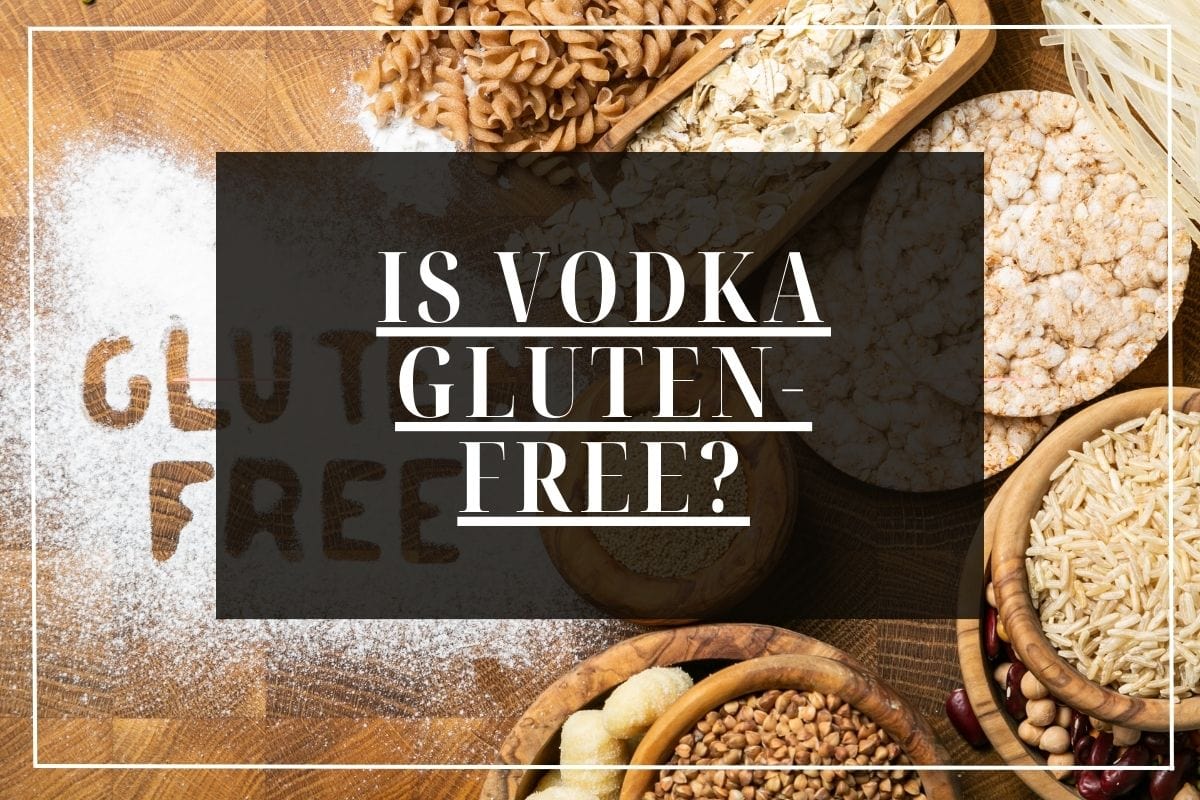Gluten-Free or Not? The Surprising Answer to the Vodka Dilemma Revealed
Choosing a vodka that suits your dietary restrictions can be a daunting task, especially if you’re gluten intolerant or have celiac disease. You might not know that the distillation process of vodka often eliminates gluten, despite being made from grains such as wheat or barley.
This article will dive into the specifics of whether vodka is truly gluten-free and provide guidelines on what to look for when selecting a bottle for your next celebration. Stay tuned for an informative journey through the world of vodkas and gluten content!
Understanding Gluten in Vodka
We delve into the presence of gluten in vodka, examining if vodka is naturally gluten-free and the role of distillation in removing gluten. We also explore flavored vodkas as potential sources of hidden gluten.
Is vodka naturally gluten-free?
Yes, vodka can inherently be gluten-free. This is credited to the distillation process it goes through. Gluten residues and gluten peptide residues are effectively removed during this phase of production, making most distilled vodkas safe for consumption even by those with a certain sensitivity to gluten.
Pure vodka, regardless if derived from gluten-rich grains like wheat or barley, should virtually contain no traces of gluten post-distillation. Among all kinds of vodka though, those made from corn, soybeans or potatoes take the cake for being void of any potential source of gluten in their recipes.
Distillation process and gluten removal
The distillation process in vodka production plays a crucial role in removing gluten. Vodka makers often use grains such as rye, wheat, and barley that contain gluten proteins. In the distilling procedure, these grains are fermented and heated to create alcohol vapors.
These vapors get condensed into liquid form leaving behind large protein molecules including gliadin – the infamous villain of gluten intolerance. As a result of this purification stage, distilled spirits like vodka have undetectable or extremely low levels of gluten residues or peptides left making it safe for most people with sensitivities to consume.
Therefore even grain-based vodkas can be considered naturally gluten-free after distillation showcasing the effectiveness of this process in achieving significant gluten removal. It’s worth noting though that flavored vodkas might not follow suit depending on added ingredients post-distillation, an aspect which needs careful consideration by discerning consumers.
Flavored vodkas and potential gluten sources
Flavored vodkas often present a delightful twist to the traditional vodka taste. However, for individuals with gluten sensitivities or celiac disease, therein lies a potential problem.
Adding flavors to vodka could introduce hidden sources of gluten. Manufacturers infuse flavorings after distillation is complete — this step may incorporate gluten-containing elements back into the drink.
In particular, brands like Three Olives stand out as their base grains potentially contain gluten.
Even though thorough distillation typically removes these traces, certain people still report symptoms consistent with consuming gluten post-drinking flavored varieties of grain-based vodkas.
The safest bet for those closely adhering to a strict no-gluten diet might be opting for corn-based, soy-based, or potato-based vodka products but ensure you always check ingredients and confirm production processes prior consumption for peace of mind and optimal health outcomes.
This way, everyone gets to enjoy festive nights without worrying about unexpected hitches!
Factors to Consider When Choosing Gluten-Free Vodka
When choosing a gluten-free vodka, consider examining the ingredients and look for those totally made from naturally gluten-free sources such as potatoes or grapes. It’s important to question how thorough the distillation process is in removing possible traces of gluten.
Lastly, opt for brands that conduct rigorous testing and have official certifications stating their products are genuinely free from any presence of Gluten.
Ingredients
Understanding the ingredients is crucial for choosing gluten-free vodka. Various origins exist for vodka, including grain-based, corn-based, soy-based, and potato-based vodkas. The primary concern lies within grain-based vodkas as they occasionally use wheat in the fermentation process, possibly leading to traces of gluten.
Contrastingly, corn-based, soy-based and potato-based vodka typically stand as safer alternatives given their naturally gluten-free base. Think twice about flavored vodkas; sometimes these involve malt additives contradicting a strict gluten-free diet.
Make sure you scrutinize labels thoroughly before purchasing for a smooth and worry-free sip!
Distillation process
The distillation process plays a crucial role in making vodka gluten-free. Distillers start with mash made from grains such as wheat, barley or rye. These grains typically contain gluten; however, during the distillation phase, alcohol and vapors are separated from this grain mixture.
The heat used in distillation essentially destroys the proteins (like gluten), which remain behind in the solid component of the original mix. Hence, what remains is pure liquor – containing ethanol and water mainly- that should theoretically be free of any detectable traces of gluten post this process.
This occurs because liquids evaporate at different temperatures: lighter components like alcohol tend to vaporize quicker than heavier ones (such as water and other residues). This knowledge gets utilized significantly by skilled distillers while regulating temperature controls throughout various stages of distilling spirits, ensuring maximum purity and thereby creating truly magnificent Glutenfree beverages for consumption.
Yet it’s essential to know that even though FDA states distilled spirits need not contain detectable traces of Gluten if not introduced after-distillation-process, mishandling during processing or contamination can potentially reintroduce small amounts into finished products unintentionally—hence why reading labels vigilantly becomes mandatory when choosing your pint! So always look for specific indications towards ‘certified’ Glutenfree vodka brands.
Gluten testing and certification
Gluten testing in vodka involves rigorous examination to ensure the product is safe for consumption by individuals with gluten intolerance. Organizations such as Gluten-Free Certification Organization (GFCO) conduct thorough lab tests on vodkas asserting a gluten-free claim, allowing only those meeting strict standards to sport their reputable certification labels.
To choose wisely, consumers should check for these recognized certifications and read product labels thoroughly. In case of further doubts regarding the vodka’s ingredients or distillation process, contacting the manufacturer directly provides definitive answers about its gluten content.
Keep an eye out for brands sporting credible gluten-free labels like those offered by GFCO when shopping for your next bottle of vodka.
The Top Certified Gluten-Free Vodka Brands
Exploring the market reveals numerous top certified gluten-free vodka brands. You’ll find several options that are safe and enjoyable for people on a gluten-free diet.
- Blue Ice Vodka offers a versatile selection, with gluten – free Potato, Huckleberry and Wheat variations.
- Bombora Vodka has achieved certified gluten – free status, making it a safe option for those avoiding gluten in their diet.
- Tito’s Handmade Vodka stands out among the crowd with its promise of craft quality and gluten – free credibility.
- Ultrapremium Cîroc Vodka is a unique offering in the mix, distilled from grapes instead of traditional grains, hitting high notes on the luxury front while still being wholly void of any gluten content.
- Pure, distilled vodka brands such as Cold River Vodka are often popular choices because they are confirmed as being gluten-free and safe for individuals diagnosed with celiac disease.
- Crystal Head Vodka commits to using only traditional gluten-free grains in its distillation process, earning itself favour within the community of gluten-free vodka enthusiasts.
- Lastly, Luksusowa retains brand loyalty by presenting consumers with an unflinching consistency in delivering quality assured, certified gluten-free vodka to market.
Is Vodka Safe for People with Celiac Disease?
The safety of vodka for people with celiac disease varies from person to person. While it’s universally accepted that the distillation process removes gluten proteins, some sensitive individuals might still experience discomfort or symptoms.
Even though the National Celiac Association has given its approval, not everyone with celiac disease may respond well to all types of vodka. Distilled alcohol, such as vodka made from gluten-contained grains like wheat, barley or rye is generally considered gluten-free and should be tolerated by most individuals.
Nonetheless, there are exceptions for those who have extreme sensitivity towards these grains or suffer severe symptoms. In these cases, it’s always advisable to select a brand that uses alternative sources like corn, grapes or potatoes instead of traditional grains-grown spirits.
One example is Stolichnaya Vodka which utilizes corn and buckwheat in production and is certified entirely free of gluten – a safer option if in doubt about your body’s reaction towards grain-based vodkas.
Conclusion
Finally, the nature of vodka’s distillation process renders it largely gluten-free. However, one must be cautious with grains used and flavored vodkas that could potentially contain gluten.
Always consider checking labels or contacting manufacturers to ascertain the product’s safety for those with celiac disease or gluten sensitivity. So yes, enjoying a glass of vodka could be perfectly aligned with maintaining a strict gluten-free lifestyle!




